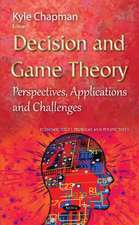Information, Incentives and the Economics of Control
Autor G. C. Archibalden Limba Engleză Paperback – 21 dec 2005
| Toate formatele și edițiile | Preț | Express |
|---|---|---|
| Paperback (1) | 279.17 lei 6-8 săpt. | |
| Cambridge University Press – 21 dec 2005 | 279.17 lei 6-8 săpt. | |
| Hardback (1) | 719.96 lei 6-8 săpt. | |
| Cambridge University Press – 23 sep 1992 | 719.96 lei 6-8 săpt. |
Preț: 279.17 lei
Nou
Puncte Express: 419
Preț estimativ în valută:
53.42€ • 55.92$ • 44.46£
53.42€ • 55.92$ • 44.46£
Carte tipărită la comandă
Livrare economică 31 martie-14 aprilie
Preluare comenzi: 021 569.72.76
Specificații
ISBN-13: 9780521022798
ISBN-10: 0521022797
Pagini: 192
Ilustrații: 6 b/w illus. 1 table
Dimensiuni: 139 x 216 x 13 mm
Greutate: 0.25 kg
Editura: Cambridge University Press
Colecția Cambridge University Press
Locul publicării:New York, United States
ISBN-10: 0521022797
Pagini: 192
Ilustrații: 6 b/w illus. 1 table
Dimensiuni: 139 x 216 x 13 mm
Greutate: 0.25 kg
Editura: Cambridge University Press
Colecția Cambridge University Press
Locul publicării:New York, United States
Cuprins
Preface; Part I. Introductory: 1. Two preliminary matters; 2. Extended preferences; Part II. Iterative Controls: 3. Feedback control processes; 4. First example: an externality problem; 5. Second application of the control process: Lerner's problem; 6. Third example of the control process: implementation of a second-best solution; 7. Two examples of the control process in a mixed economy; Part III. Non-convexities: 8. Non-convexities in the technology; 9. Non-convexity and optimal product choice; Part IV. Cooperatives: 10. Pareto-improvements and cooperatives; 11. Achieving pareto-efficiency in the LMF; 12. Risk-sharing in Illyria (the ELMF); Appendix: the taxation of economic rent; Notes; Bibliography; Index.
Recenzii
"Archibald's book is timely: its contents throw light on several important current debates which are being argued within frameworks less appropriate than the one he sets out...this is a short, insightful, and timely book in a distinguished interventionist intellectual tradition in the area of public policy and public institutions." Geoffrey Heal, Journal of Economic Literature
Descriere
This 1992 book examines alternative methods for achieving optimality without all the apparatus of economic planning.














